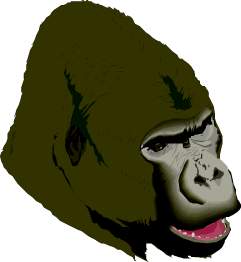 To London Town. Wednesday, February 12, 2003.
To London Town. Wednesday, February 12, 2003.
Almost all of the lights in the cabin are out; just mine and a couple of others offer isolated "bright spots". The flat-panel screen in front of me says we're flying at 31,000 feet, at 700 miles per hour (150 mph tail wind), and we're 1768 miles from London -- well over half way from Miami.
I look out the window and can barely see the wing silhouetted against a nearly black background of clouds below and dimly lit (by the moon) sky above. It's 22:31 (Wednesday) Miami time, 03:31 (Thursday) London time.
I feel a grand euphoria. I'm on my way back to Africa, this time, for the first time, to Uganda. I expect to meet (brother) Jim at the Heathrow Hilton in about four hours. He is flying from Chicago -- if his flight isn't delayed by weather. Grand Rapids was dumped on by a snow storm, and when I checked the Weather Channel at home this morning, it looked like Chicago was being hit, too.
I'm thrilled about returning to Africa. I'm energized with excitement, but at the same time apprehensive. Strife around the world and hatred are at explosive levels. When will the terrorists strike next? And how? And where?
Just before I left home I saw an article on the Internet reporting tanks in the streets of London, mobilized to counteract threatened rocket attacks on flights in or out of Heathrow. That's not comforting.
My flat-panel screen now says I'll be there in two hours and 42 minutes..
 On to Entebbe. Thursday, February 13, 2003 (malaria tablet day).
On to Entebbe. Thursday, February 13, 2003 (malaria tablet day).
I thought the excitement would eventually wear me out and I'd nod off for a half hour or so, but no, I'm still charged and wide awake as the plane circles above Heathrow, waiting for traffic to clear. A hydraulic valve (I think that's what the pilot said) delayed our Miami departure by about 90 minutes, but a strong tail wind recovered two-thirds of that. We're landing at about 07:00, a half hour late.
The line to get through customs is ridiculously long, but when I get to the desk of the customs officer, it takes only seconds.
At baggage claim I fear my luggage is missing and, sure enough, a look at my ticket tells me it has been checked all the way through to Uganda! My plan was to leave one bag here, with a heavy coat and several other items, and retrieve it on the way back. It's time to figure out "Plan B".
I could retrieve my things, I am told, but it would likely take a lot of time, probably hours, so I guess I'll just head to the Hilton.
The good news: a free train ride from Terminal 3 to Terminal 4 and a walk from there will get me to the hotel. The bad news: it's a six-minute walk and it's cold!
I expect Jim, also flying with a 150 mph tail wind, to get in about the same time, but at the Hilton I find he has not yet arrived.
He rattles the door knob of the room about an hour after I checked in. His was an anxiety-filled trip. First school and business closings in Grand rapids due to a foot of snow that had fallen overnight; then worry if his flight would take off, or if he could even get to the airport; a long wait in Chicago for his British Air flight; fitful attempts at sleeping over the Atlantic; and finally the dreaded "six-minute walk" in the cold with three heavy bags.
Although we both had breakfast on our flights, we decide to have breakfast again and then opt for the full buffet. One reason: it's time for our malaria tablets and they should be taken at a normal-sized meal. Another reason: for some reason, we're both hungry!
After eating, we head back to our hotel room and turn on the TV to catch up with the news. It's not encouraging. Gatwick Airport was evacuated when a man was found with a hand grenade. Live reports on TV from Heathrow's Terminal 4, in clear view just across the street from our Hilton window, show military personnel and vehicles patrolling the perimeter. Reports that stinger missiles may be waiting under the flight path of British Air flights departing from Heathrow add to the uneasiness.
We do the only sensible thing to do under the circumstances: take a nap!
We are comfortably and peacefully sleeping when what sounds like a powerful jackhammer drill shakes us awake. It's loud, it's deafening, and it's right overhead. Apparently some kind of construction project is underway in the room directly above ours.
We wait patiently, hoping the racket is short lived, but quickly conclude a room change is the only remedy. In a room on the other side of the hotel we find quiet . . . and sound sleep.
After our rewarding naps we each take a shower, then wander around the lobby for a while. Its late afternoon and time for a bite to eat. At 19:00 we check out of the hotel and brave the six-minute walk to Terminal 4.
It's a madhouse. Hundreds and hundreds of people are swarming around the check-in desks. The lines are endless, disorganized, and occasionally the travelers are surly. Just as it appears the wait may jeopardize catching our flight, an attendant diverts a dozen or so of us to an open counter and we're quickly checked in.
It is but one hurdle to reaching our gate, however. The line to enter security is maybe twice as long as the line from which we were just rescued. We go all the way to the back and begin the wait. Actually, it's two lines and though it doesn't move quickly, it does move. It seems many of the travelers who were evacuated from Gatwick were bussed to Heathrow, exacerbating the congestion and lengthening the lines.
Finally we load our carry-on items onto the "X-ray" machine belt and walk through the metal sensor. Jim makes it. I don't.
I spread my arms and a man uses just his hand to "check me out." "Where's your hand scanner?" I inquire. "This is a whole lot better," he replies, as he frisks first my left leg, then right. "And it feels so nice," I add in a jesting voice. The inspector is amused.
Though it's politically incorrect, I "profile" the passengers while we are waiting to board the plane. No one appears to be a threat. I think we'll make it to Uganda safe and sound.
After a brief delay in the plane's "push back" from the terminal, then another on route to the runway, we take off. By now it's dark and I peer out the cabin window to check for missiles. Pleasantly, not one can be seen.
After supper is served (surprisingly good for "air food"), Jungle Jim begins his "nesting" activities by arranging and rearranging his pillow, blanket, light jacket, and eye shade. He fusses and organizes and rearranges things until everything is just right. Then, with a grunt of exasperation, he tosses it all aside and heads up the aisle for the toilet. Upon his return he begins the arranging process anew.
 Animals in Entebbe. Friday, February 14, 2003.
Animals in Entebbe. Friday, February 14, 2003.
I peek out my cabin window. At a little before 06:30 a hint of color appears on the horizon in the east. The sunrise has begun: deep maroons become discernible, then reds, then yellows, even pastel greens and blues. The sky appears cloudless as nature turns on the lights. Entebbe is now just two and a half hours away.
We land on a long north-south runway, the only runway at the airport. After customs and getting our bags (both of my bags made it!), we look for a representative to meet us. There is no representative to meet us, so we find a Hotel Lake Victoria vehicle, get in, and proceed to the hotel.
In our room (#237), we find the bathroom has only one set of towels, so Jim calls to request a second set. Instead of a human being, he receives a message advising him to press "2" and a person will respond immediately. Moments later the phone rings and when Jim answers it, he requests a second set of towels.
Well, as it turns out, it isn't housekeeping calling, but rather the tour representative, Dawn, who should have met us at the airport! Jim apologizes for asking her for towels. She thinks we're a bit loony.
Jim and I meet Dawn in the lobby and the three of us sit on the veranda sipping passion fruit juice or ginger ale while she goes over our itinerary. It sounds like an exciting twelve days are ahead.
After an hour or so, Dawn departs and we make a bee-line for our beds. The time zones are taking their toll. We're asleep in moments.
Up at 13:30, we quickly determine lunch is in order and it is served on the veranda. We both have chicken with French fries, peas, and carrots.
We're off on a walk to the nearby -- about a mile or so -- zoo. Walking along the road I naturally feel like a tourist, but I also feel almost like an intruder as well. We are the only whites in sight. Locals are courteous and respectful, but I feel out of place. Some men approach us and offer to escort us the to zoo. Some offer us a scooter ride. Some offer to be our personal tour guides at the zoo. We decline, with thanks, all these proposals for service.
The zoo is pricey: $12 (U.S.) each! We point out that the posted amount is close to $6.00 with existing currency conversion rates. The attendant is unyielding: $12 apiece! He makes up some lame excuse that the conversion rate only applies to transactions for amounts of $100 or more. We assume we're being ripped off, but we pay the requested amount.
The zoo is nice, but hardly comparable to any large city American zoological park. We see the otters, donkeys, crocodile, buffalo, monkeys, chimps, rhinos, ostriches, wild boars, kob, leopard, lion, and others. Leaving the zoo at 17:30, we're back at the hotel a half-hour later, and we enjoy a "Stoneys" drink (like ginger ale, but with more punch) on the veranda.
Time passes quickly and we order supper (spaghetti), then repair to our room to repack our bags. We will each leave one bag here at the hotel and retrieve it at the end of our Uganda adventure.
 Flight to the Falls. Saturday, February 15, 2003.
Flight to the Falls. Saturday, February 15, 2003.
We are breakfasted and ready to go at 08:00. Dawn meets us, just to see us off apparently. She introduces us to Mohammed, our driver, who delivers us to the airport. There I try unsuccessfully to cash an American Express traveler's check. The hotel wouldn't accept it and at the airport currency exchange counter, I'm offered 1850 Uganda shillings per dollar in cash, but only 1500 shillings per dollar for American Express. On my next trip I think I will leave home without travelers checks. I buy $80 (cash) worth of shillings.
As we're walking out one door, in another door walk two people covered with blood on their arms, faces, and clothing. Jim and I later see the man in the men's room cleaning up. He explains he and his companion (wife?) were in a serious traffic accident on route to the airport. He says, if I understand him correctly, that someone died in the crash. He seems in shock. I'm not surprised.
We meet Emma, our pilot for this morning's charter flight north to Murchison Falls. She's young and attractive. I guess she's in her thirties. She laments to Jim that women pilots don't get proper respect. I surmise that for her, proper respect is more respect than male pilots receive. Male charter pilots I've flown with before always carried some of my luggage. Jim and I have to carry all our bags to the plane this time.
Going through security I trip the buzzer on the metal detector. I explain to the agent that it's the large shoelace eyelets on my boots. He waves me through with no further inspection. Security?
Jim climbs in the back seat of the small, single-engine, Cessna plane; I take the front seat, on the pilot's right. I'm wearing earphones and a microphone so I can hear Emma's dialog with the control tower and can talk to her.
The flight, at about 6400 feet above sea level (3900 above the terrain below) through a light haze, is uneventful until we reach Murchison Falls. Emma circles the falls to give us a beautiful birds's eye view. Spectacular! Thanks, Emma!
We are met at the Bugungu "airport", actually just a remote landing strip, by Gabriel, our driver, guide, and -- for ten days -- companion. He drives a four-wheel Toyota Land Cruiser. We bid Emma goodbye and Gabriel heads for the Nile Safari Camp, about 19 km (12 miles) away. The roads are as we expect: mostly dirt, dusty, and bumpy.
The camp director meets us as we arrive and we are treated to wet towels -- refreshing -- and a drink of passion fruit juice -- likewise.
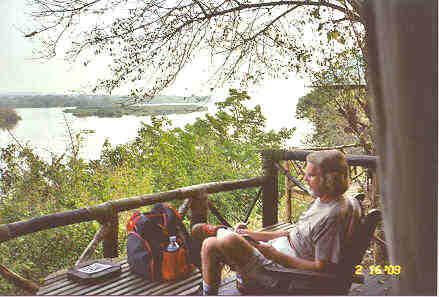
We have an hour plus to examine the camp, sit on the front "porch" of our permanent tented accommodation, and drink in the sights along the Victoria Nile River which flows quite quickly past us just 20 feet or so below our perch on the river bank. We see elephants and pods of hippos on the other side of the wide expanse of water. The temperature is delightful and the peacefulness and beauty are delicious.
Lunch is served at 13:00 hours (quiche, with mixed fruit for dessert -- good!) and at 14:00 we're again back in Gabriel's Land Cruiser on our way to a ferry across the Nile and a game drive in the Murchison Falls National Park.
The drive is rather routine -- antelope, wart hogs, giraffes, and other assorted animals are roaming about the vast grassland, much of which has been burned off -- until near the end, when we come upon two female lions lying under a bush perhaps ten yards from the road. We shoot pictures and watch excitedly, when -- from out of "nowhere" -- a male lion crosses maybe ten feet behind our vehicle and joins the two females.
"Listen," I say in a hushed town, "I think I hear a lion roaring off in the distance." Jungle Jim looks over at me sheepishly. "That noise was my stomach!" he confesses.
Apparently, the three lions were engaged in the early stage of a hunt for something to eat. Numerous antelope are grazing off in the distance and the lions eye them.
We watch as they make their way through the grass, often disappearing completely in it.
The last ferry back across the Nile is scheduled for 19:00 hours, so we must press on. But soon we come upon three elephants: father, mother, and baby. Gabriel drives off the road toward them so we can get a good look. The pachyderms are not amused as we get closer and the big male makes a mock charge at us. Thrilling!
But I didn't get it on video, so Gabriel again drives closer. And again the elephant charges, this time more aggressively. I think I get at least a portion of the charge on tape, along with a mighty trumpeting as the animal kicks up dust, flared his ears, and making a dash towards us. It, too, is a mock charge, but very exciting, nonetheless!
Back at the camp, the director says he was getting worried about us. It's a little before 20:00 hours and he expected we'd return an hour earlier.
Dinner is served almost immediately on a platform that overlooks the Nile. Of course it's dark, but the moon is full and an outline of the river can clearly been seen.
Dawn had warned us that the camp is in mosquito territory (and tsetse fly territory, too), so through dinner Jim and I are particularly uncomfortable as bugs are biting. The meal (beet root soup followed by roast beef, potatoes, broccoli, and cauliflower, with caramel custard for dessert) was very good.
Back in our tent, we lower several canvas panels to expose mosquito netting and allow some movement of air in the tent. It's a hot and humid night and it seems much more uncomfortable than earlier in the day.
We sit down on our beds to reflect on the day's activity but the reflection is short lived, as I drift off to sleep almost immediately. I think Jim does the same.
We awaken just minutes before the 22:30 lights-out deadline. At that time the electric generator is turned off. I take off my boots, socks, and pants and I'm asleep again instantly.
 Cruise to the Falls. Sunday, February 16, 2003.
Cruise to the Falls. Sunday, February 16, 2003.
At maybe 04:30 I awake to a wild variety of sounds. I hear the distant roar of a lion, the chirping of nearby crickets, the almost laugh-like grunting sounds of hippos probably grazing not too far away, early calls of the morning dove, and an occasional raspy, growling, most-scary-of-all-sound of . . . Jim snoring. Later, Jim tells me I might win the scary-sounding snoring contest.
Not long afterward, I hear our neighbors in Tent 2 (we're in Tent 1) awaken and begin chattering. They are departing early and seem unconcerned that their voices can be heard quite clearly and loudly by others who would prefer to sleep.
Thanks to Jim's gift to me of a pen with self-contained light, I'm able to make entries in my notebook without the use of a flashlight.
Adding to all the other sounds of the early morning, Jim's alarm clock chirps at 06:30. Hot water for the shower bucket arrives about 07:00. I view with uncertainty the prospect of bathing under a pail, but the experience is quite pleasant. The water is piping hot and refreshing. We each get our shower before the bucket is empty.
Breakfast for me consists of: a Rice-Crispie-like cereal, passion fruit juice, scrambled eggs, sausage, and pineapple and mango slices. Big breakfast!
We hop into the Land Cruiser about 08:00 and drive to the ferry, where we wait maybe 20 minutes and then get aboard a boat that can seat perhaps 40 passengers. For this trip there are just the two of us plus Gabriel, plus the ship "captain", plus an armed guide. We head for the foot of Murchison Falls.
Along the way, we see pods of hippos all over the place: along the shore, in river channels, even shallow sections in the middle of the river. It's wonderful to be able to get quite close to them without fear of an attack.
We also see a smattering of crocodiles, sunning themselves on the river bank. Our guide said some were mothers protecting their eggs, but I wasn't totally convinced the terrain was right for laying eggs.
The ride is a couple of hours and when we get maybe a half mile from the falls, the "captain" wedges the boat between a good sized cluster of rocks and a very small island in the middle of the river. Thrust from the engine keeps us in position, countering the strong river current.
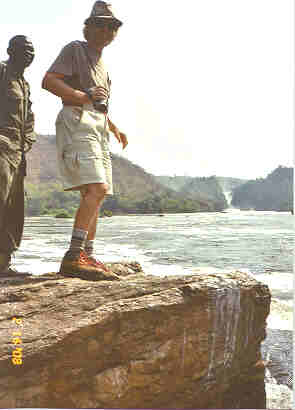
One slip and I'm in for one serious swim. Murchison
Falls is visible in the background at the right. (Photo by
Jungle Jim.)
With the guide's help, I cautiously step out on the rock for some pictures. The water races by so quickly it makes for a disorienting experience, but great fun, nonetheless.
The trip back to dock is about half as long as the trip going because of the current. Most of the hippos are still visible, but most of the crocs are gone, sufficiently heated with the sun's rays to re-enter the river.
Back in the Land Cruiser we drive about 45 minutes to the top of the falls for a spectacular close-up view. An enormous flow of water cascades through a V-shaped opening in the rocks. It crashes down into the canyon, smashes into huge rock outcroppings, and generates wave after wave of mist. It's a very impressive sight. I hope the video I take of it properly shows its might and beauty.
Before hiking around the area, however, we eat a box lunch Gabriel had brought along (ham & cheese sandwich, fried chicken leg, hard-boiled egg, crackers, apple, cookies, OJ).
Then, back in the vehicle we head for camp. At one point I mention my brother Jim, and Gabriel registers surprise. Apparently, from the expression on his face, he had assumed another kind of relationship between us.
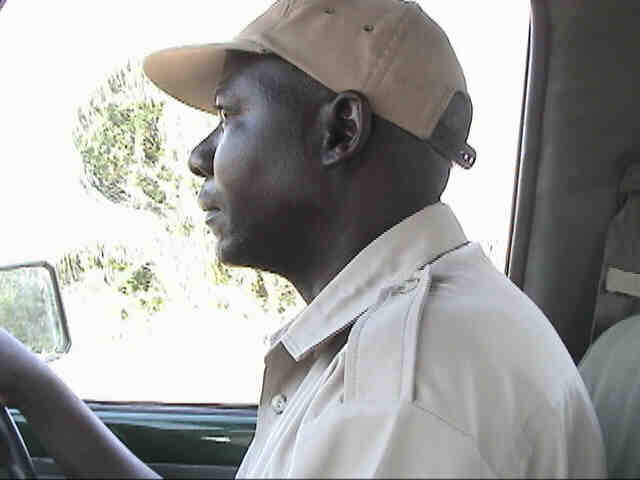
Gabriel.
I am surprised to find Gabriel is interested in world affairs and politics. He says Uganda loves Bill Clinton because he visited the country and left lots of money in "foreign aid". He says further the Uganda people believe that all leaders play around sexually . . . and all leaders lie. I reply by saying that many Americans are determined to have a higher standard for their president. Gabriel is impressed with the idea.
Back at the camp, a couple of bitter lemon drinks are a must to quench our thirsts. Then two more are required.
Viewing the Nile and the countryside from our perch on our porch is very pleasant, but a nap is an even better idea. To avoid the bugs and possible sunshine overdoses, we opt for the beds in our tent. Sleep ensues quickly.
Later, we are both awakened by a noisy racket. It seems some monkeys decided to "raid" our tent, and they throw seed pods or sticks -- maybe stones, from the sound of it -- onto the metal roofing over our tent. Later, Jim tells me they were even tossing objects at the front flap of our tent as if they wanted to get inside. Jim says he thought they might actually unzip the flap and come in!
We awake from our naps drenched. The afternoons are particularly hot and we are "swimming" in pools of perspiration.
I opt for a shower. The water is unheated, but plenty warm just from the sun. Refreshing!
Darkness falls quickly and dinner follows apace. Fearing bug attacks at the dinner table like last night, we each wear long pants, in spite of the warm temperature, but tonight it's not nearly as hot, humid, or buggy. Our menu: leak soup, chicken, rice, peas, carrots, and a unique custard-like dessert with a hard almost-peanut-brittle-like topping. We had to crack the topping with the sharp whack of a spoon to break it and eat it.
 More Game Drives. Monday, February 17, 2003.
More Game Drives. Monday, February 17, 2003.
Right now as I jot down these descriptions, it's perhaps 05:30 hours. As far as I can tell, everyone else is still asleep. I look out through the mesh panel next to my bed and see a slightly pale, but full moon that provides just enough illumination for me to see the Nile River, its far bank, and of course the outlines of trees and bushes that surround the tent. Occasional animal sounds punctuate the stillness: a far-off hippo, a cough-like utterance from probably a monkey or two, frogs, a rooster (yes, a rooster), a few bird calls, but also periods of quiet. The tranquility is magnificent.
A noise at the rear of the tent by the canvas-enclosed "shower" tells me the bucket is being filled. It's time to start the day.
We are at the dining room (actually, it's just a covered platform with openings for windows) by 07:00, on the nearby dock at the edge of the river by 07:30, and off on a cruise (west) to the "Delta", which is the point where the Nile -- the section is called the Victoria Nile -- flows into Lake Albert.
The trip is a delight. It's cool, but not too cool. The sun is rising into a generally clear sky. We're alone on the 14-seat boat (Gabriel; the two of us; George, our guide; and the "captain") and a very light breeze stirs the plant life along the river. We see more hippos, though not as many as yesterday, more crocodiles, some monkeys, and what was "advertized" as the feature attraction" a shoe-bill stork. We're told there are only 60 in all of Uganda, but I am unimpressed. The bird is standing in a clearing maybe 250 yards away. It's just standing there. It's gray, with no distinguishable characteristics I can discern; but its beak, we are informed, looks like a shoe. Yawn, yawn.
Back at the camp we each enjoy a bitter lemon drink as we sit on enormous, but pleasantly soft pillows on two huge chairs made from the limbs of trees. Our vantage point is right next to the open-air bar which is a few paces away from the "dining room".
Gabriel tells us our next activity is a game drive that departs at 14:00 hours.
We drive to the ferry, cross the Nile, and start out. The scenery is getting familiar: burned out grasslands, a smattering of antelope, an occasional giraffe, wart hog, buffalo, and an elephant some distance away. Our guide directs Gabriel to drive to a spot he had seen lions in the morning. No lions are seen so we drive from one tree to another in hopes some lions will be resting in the shade.
The strategy is successful. We find two lions -- a mile and a female -- and Gabriel maneuvers the Land Cruiser so it's maybe 20 feet from the resting pair. They eye us as we take pictures. My window is open so I have a good view. The hatch on top of the vehicle is also open so I'm able to stand up and get another angle. The pictures (if they turn out) are fantastic. The male yawns to reveal one of his long front teeth is missing. He gets up, then lies down again. He watches us closely.
After some time, Gabriel starts the engine and we slowly pull away from the scene. We continue our search for more lions, and we hit the jackpot: seven male lions in a patch of trees and bushes. We take more pictures. It's an adrenalin rush.
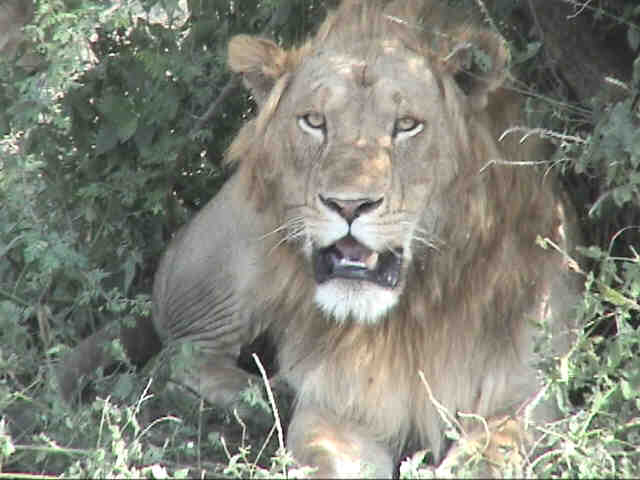
We stare at the lion and he stares back at us. Notice he has a tooth is missing.
Gabriel maneuvers the vehicle around the group so we're face to face with what our guide believes is the "leader of the pack". The battery in my camcorder runs out of power and I slip in a replacement. Before I'm ready to continue taping, the leader roars and leaps forward a little. I resume shooting video and a few minutes later we drive off. Wow!
I felt safe during the encounter because of my lion confrontation six years ago in Botswana. I ask our guide what would have happened if the leader lion had charged in earnest. He said the other six would have joined him in a split second and the animals would have been all over the Land Cruiser. He said a lion could, and would reach a paw through a window and pull out a victim. Then it would be dinner time. After the incident I find Jim, Gabriel, and our guide had their windows up. I was the only jerk begging to be an hors d'oeuvre. Like I said, it was a thrilling moment.
Driving on, we come across yet another lion (this one makes #10 for the day), lying by a bush a dozen or so feet from the edge of the road. We take a few more pictures, the lion gets up, and then we notice one of its hind legs is injured. The wounded animal limps off into the tall, brown grass and almost immediately disappears in it.
We then head back to the ferry. Waiting for it we are stunned to see what looks like a World War II-vintage personnel carrier with a gun turret on top rumble toward us. A few moments later we see a second vehicle, like the first, appear and clank by. Then, moments later, an actual tank with soldiers atop it clunks by. It's like being in a budget war movie. But the "show of force" isn't terribly intimidating.
The explanation for the "maneuvers" is that the drive-by is a readiness test, should hostilities with Sudan heat up. I'm sure the Uganda army has a lot more impressive fighting men and machines than what we witness.
Now we are faced with a conundrum. We need gas for the Land Cruiser for our trip tomorrow, but the gas station where we wish to purchase fuel doesn't open until 18:00 hours, the very time we must be on the ferry for our ride across the Nile (it's the last ferry of the day). Gabriel does some tricky negotiating with local people he knows and with some borrowed shillings from me, he gets enough fuel to at least get us to another station.
To our dismay, dinner isn't served at 20:00 as expected. It's more like 20:30: minestrone, Tilapia fish (surprisingly good), cooked sliced potato (they were described as "potato chips"), cauliflower, and chocolate pudding for dessert. Still thirsting from the trip, we are disappointed when no one takes our order for mineral water (for Jim) and Fanta Orange (for me).
We try to pack for tomorrow, but in the near darkness it's almost impossible. The dim electric light is not even as good as a flashlight. We are thankful we brought flashlights. We throw our things in our bags and hit the hay.
 The Drive to Kibale. Tuesday, February 18, 2003.
The Drive to Kibale. Tuesday, February 18, 2003.
We are breakfasted and ready to go at 07:30. We bid farewell to the camp director and the entire camp staff, which has come to see us off. Nice touch.
For the first two hours of our drive we are eager to see the sights: local people walking along the road, school children all in the same color shirts, a truck stopped at the side of the road with workers stomping on a big load of cotton to maximize the size of the shipment, occasional schools (Catholic, Protestant, Muslim), rows of tiny bricked enclosures -- not unlike a miniature strip mall -- offering various products and services, bike riders -- mostly carrying heavy loads (cassava, timber cut for firewood, cotton, an oil drum, and all manner of other objects), and an occasional baboon, mongoose, or other wild animal.
But, after the first two hours, the ride becomes a drag. The road is mostly dirt and/or gravel (though there were two paved sections), and miscellaneous bumps, pot holes, and washboard sections, and it gives us lots of ups and downs. Our drive takes close to seven hours.
The lives of many inhabitants of Uganda are almost as austere as many eco-extremists would wish to impose on the entire world. They live in mud huts -- maybe 12 feet in diameter -- with no electricity, no running water, no telephones, no cable, no kerosene lantern, no refrigerator, no air conditioning, no TV, no newspapers, no magazines, no CDs, no computer, no automobile, and no books.
They do have some land, which they own (it's probably used for planting cassava). They may have a bicycle, maybe a portable radio, some clothes, and that's about it. They have to walk a mile or more in some cases for water, and carry it back "home", often over hilly terrain (the wives generally perform this task with plastic containers which they balance on their heads). They have to start a fire to cook their food, and often it's the only light available at night. Their toilet facilities are just an outhouse. In the evenings there are, roughly speaking, only three things to do: talk with your family or a neighbor, go to sleep, or engage in . . . The average family size in Uganda is seven, so that third alternative is often the selected activity.
We arrive at the Mantana Africa Safari Luxury Tented Camp about 14:30 (some, myself included, might wish to debate the "Luxury" designation) and meet Julius, the manager. The camp site is located just outside the Kibale Forest. A late lunch (onion soup and cheese sandwiches) follows and shortly after that we're off on a short walk with a guide through the forested area around the camp to see monkeys. We see a few, but they are way up in the trees, almost completely out of camera range. One makes a dramatic leap from a high perch to some nearby bushes and then scampers off. The walk is a little disappointing.
Dinner (melted cheese on bread, potato soup, beef -- it was called "mince meat", but was really "minced" meat, a.k.a. ground beef --, mashed potatoes, gravy, peas, and a hot pineapple concoction for dessert) is served after 18:00 hours and a surprise rain shower. At the dinner table we meet husband and wife (I assume) bird watchers who have fallen for the-earth-is-warming, the-birds-are-dying, DDT-was-a-terrible-mistake story line. It becomes clear immediately that no one at the dinner table will change sides in any argument on the subjects, so we spar verbally briefly, then disengage. They say the U.S. policy in the Middle East has been an utter failure, the campaign in Afghanistan was likewise, and we should "solve" the Iraq problem with a bunch more inspectors for the next ten years. I finally remark we can all agree the sun has set. Yes, we could agree on that.
Back at our tent, Jim races to take a shower since he is informed the bucket has just been filled with hot water. He notices a stopper in the sink and is puzzled as he thought he had removed it earlier in the day. He pulls at the stopper only to discover, much to his surprise, he's holding onto the tail of a little mouse. After a brief outburst of alarm, he asks the shower-pail attendant to dispose of the varmint. The attendant is uncomfortable with the assignment, so he removes the entire sink, inverts it, and frees the creature, which had been unable to scale the slippery sides of the sink.
Our tent toilet leaves much to be desired. First of all, it's inside a pitch black (actually a dark green) canvas enclosure, making proper body "placement" over the opening a little haphazard. Second, it's just a hole in the ground (maybe there's a container there) and after each use, a small shovel or two of "sand" is to be placed there to "manage" odor and, I suppose, to facilitate hygiene. I'm afraid I'm a little too "civilized" to cozy up to these old conveniences.
 Chimps or Chumps? Wednesday, February 19, 2003.
Chimps or Chumps? Wednesday, February 19, 2003.
Sometime during the middle of the night I am awakened by Jim, speaking in a loud, strong voice -- almost a yell -- saying "Who's there?" It must be some crazy dream he's having. In the morning he says he had a series of strange nightmares during the night.
This morning it's quite cool. I'm wearing long pants, a T-shirt, and a light sweatshirt, and I'm still a little chilly. I'm sure the temperature will rise shortly, but it may be a bit nippy during the early stages of our three-hour chimpanzee trek, which is scheduled to depart at 07:45.
We drive to the Kibale Forest office, where the walk begins. There are five of us: a German couple, Johnson (our guide), Jim, and me. After a fairly short hike, we stop and look up at an enormous fig tree. Johnson announces: this is the spot! This is the spot where the chimps were yesterday morning! There are no animals to be seen. I inquire, "Which way did they go?" Johnson replies, "That way," he says pointing to his left, "or maybe this way," pointing to his right. "There's no way to know which way they went." I wonder: so how the heck will we find the critters?
So our trek becomes a game of hide and seek. We march along through the forest: over logs, under vines, around trees, and we stop occasionally so Johnson can listen for chimpanzee noises. From all appearances, he hears no noises.
At one point I'm caught on some sharp and captivating thorns. One of the Germans remarks, "In Australia they call that a lawyer bush."
Jungle Jim and I are beginning to suffer from the traditional mid-trip "loosies", but Jim is harder hit than I am. So much so that there is an "incident" in the forest . . . but you should ask Jim about the details.
We're tripping over forest litter. We're slipping on moist leaves. We're climbing up inclines. We're hiking down inclines. We see a duiker (a small antelope) that's just visible maybe 50 feet ahead. There are numerous butterflies fluttering about. But the chimps are all AWOL.
After a couple of hours, Johnson stops, looks up in another fig tree, and announces that a chimp is resting between two branches near the very top. We strain to see him. Finally, there's a little movement and we can imagine an animal is up there. Johnson finds another fig tree and spots what he says is a mother and baby chimpanzee lying comfortably in the upper-most branches. Looking through the foliage we can also imagine the two of them. Using binoculars makes the imagining a little easier.
We decide to wait around hoping one or more of the critters will come down and socialize. Our wait and hopes are in vain. After quite a while we decide to conclude our search and return to our starting point. It turns out to be a four-hour chimp trek. I'm beginning to think it was a chump trek.
The two of us are beat. Four-hour hikes over up-and-down terrain can be physically exhausting. Sadly, for our egos, the German couple and Johnson appear ready to repeat the trek immediately. the couple actually makes an appointment to do it all over again tomorrow morning.
On the drive back to the camp, we spot a snake in the middle of the road. We're told it's a black mamba, one of the most venomous and deadly snakes in the world! I hop out of the Land Cruiser to get a video picture. It's maybe five feet long and I get real close with my camera.
Oh, did I mention: it's dead. It had been run over.
(Although Gabriel identified the snake as a mamba, I subsequently learned via e-mail note from Erik Postema, reptile keeper in the Netherlands, that it's a forest cobra: Naja melanoleuca. Thanks, Erik.)
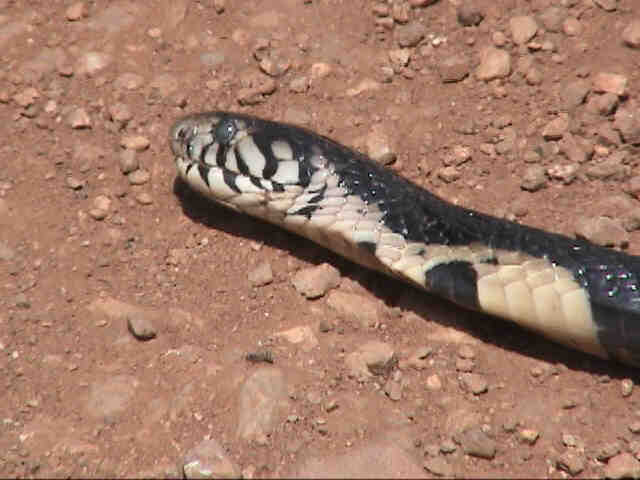
This snake has been run over on the road. I wouldn't dare get this close otherwise.
Lunch (tomato soup, pasta shells, carrots, a sloppy-joe-like hamburger concoction, and banana torte with honey for dessert) is served shortly after we arrive at the camp.
At 15:00 Gabriel drives us to the swamp walk office and Jose, our guide, is introduced to us. He's a young lad, quite new on the job we learn later, and he leads us on a path that circles a nearby swamp.
As a result of this morning's disappointing chimp trek, I set my expectations very low for the swamp walk. My expectations are met! But just barely. We see some birds (not interested), some monkeys (actually quite a few -- maybe a dozen -- but they're some distance away), some cattle (taken to the swamp to drink, I suppose), and a grasshopper (just to be fair: it was a big one). I get a sore knee about two hours into our three-hour walk, so for me the hike turns into a swamp "shuffle".
On one turn of our path, we run into maybe ten school girls all decked out in their uniforms. When they see us they burst into uncontrollable laughter. I don't know if it was my limp, my crumpled hat, or something else entirely that amused them so.
We have dinner at 19:00 and Gabriel joins us at the dinner table. It's a treat to converse with him. He tells us he only wanted two children, but when they turned out to be girls, decided to try again. It was a boy, but then Gabriel decided his son needed a brother to talk to, so he tried again and it was another boy.
During my evening shower I run out of water just as I had worked up a good shampoo lather. "Oh, no!" I say aloud, imagining an ice-cold rinse from a container by the sink.
Just then I hear a voice coming from outside the tent by the water bucket: "You want more hot water?" How nice that someone waits there to rescue bathers who need another pailful to complete the wash-up.
 Uganda Luxury. Thursday, February 20, 2003 (malaria tablet day).
Uganda Luxury. Thursday, February 20, 2003 (malaria tablet day).
We're ready to go shortly after 08:00, so we pile in the Land Cruiser and head south toward the Queen Elizabeth National Park. The drive is very pleasant as the temperature is good and the sights are interesting: a smattering of wild life, lots of foot and bike traffic on the road, and a stop in Fort Portal for gas. Fort Portal is a good-sized city, bigger than Entebbe as a matter of fact, and it's fascinating too see the buildings, cars, signs, and activity.
We arrive at the Mweya Safari Lodge -- located in the QE Park -- sometime after 13:00. It's luxurious! A large statue of an elephant stands at the entrance. The reception area has a high ceiling with hefty wooden posts used for support. There's a beautiful indoor/outdoor restaurant (the indoor section is air conditioned!), and there's a stunning swimming pool. From numerous vantage points one can see down to the Kazinga Channel and across to where elephants and buffaloes drink by the water's edge and hippos lounge peacefully just off shore. Over to the left, across a spit of land we used to get to the lodge, can be seen Lake Edward and more animals drinking along the shoreline.
Our room (#10) isn't ready, so we take a seat in the restaurant and order lunch (hamburger for Jim, salad for me). At this stage of our journey we begin to suffer from the post-mid-trip "firmies". Pleasantly, our suffering is very mild.
At 14:45 we once again load into the Land Cruiser and drive a short distance to a dock on the Kazinga Channel, where we board a boat very similar to our Victoria Nile cruise vessel. The channel ride is two hours of leisurely motoring along the shore opposite the lodge. This time we are not alone. Probably 25 or so tourists and aboard with us. Janet is our guide and she identifies each bird and animal along the way. There are lots of buffalo and hippos, some elephants, and two monitor lizards, in addition to "less interesting" sightings.
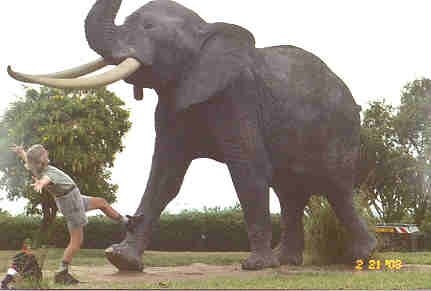
A word of advice: don't get too close to the animals, as they can be a bit ill-tempered. Another word of advice: NEVER get THIS close! Unless the animal is a statue. (Photo by Jungle Jim.)
Following the cruise, we go on a game drive, but find no "new" animals. A leopard sighting had been reported, but we couldn't find him.
It's dark when we get back to the lodge. We eat dinner in the air-conditioned portion of the restaurant. Pleasant surroundings, tasty food, and excellent service.
It's after 21:00 before we're back in our room. This is the first camp or lodge with any selection of postcards, but the selection is disappointing. We buy a bunch (along with stamps) and fill them out in the room. I also charge up one of my camera batteries and make some entries here.
We also prepare for tomorrow's game drive and forest walk. Gabriel's instructions are for us to meet him in the reception area at 06:30.
 A "Gorge-ous" Walk & More Animal Sightings. Friday, February 21, 2003.
A "Gorge-ous" Walk & More Animal Sightings. Friday, February 21, 2003.
We take packed breakfast boxes with us as we depart the lodge shortly after 06:30 -- before down. We drive for about 40 minutes to a little picnic spot just a kilometer or two from our destination. The breakfast isn't very good as far as I'm concerned (sandwiches of cheese or butter -- I can't tell which, hard-boiled egg, muffins, a peach, orange, banana, and a bottle of water).
Our destination is a path that leads from the dirt road down into Chambura Gorge. We meet two couples there and our guide, Van, and after a few introductory remarks, we "go in".
A river runs along the floor of the gorge and supports a thick and lush forest. Once again, it's a strenuous exercise for Jim and me, particularly negotiating steep inclines and maneuvering around twisted vines and fallen trees. The others take the obstacles in stride . . . without heavy panting and any display of exhaustion. Ah, youth!
We pause at a pod of hippos, and we're told it's not a pod but a "school". (Others have said "pod".) But the highlight is a chimpanzee sitting up not too far in a tree as he eats fruit. We watch and take pictures for some time and then one of the women decides to walk across to the other side of the narrow river on a fallen tree that had conveniently created a "bridge".
One by one the others, including Van, carefully navigate the balancing act and reach the other side. Jim and I decide that at our stage of life, balancing isn't exactly our forte, so we stay on "our" side of the river.
In a short time the chimp is scared by the encroaching tourists, and he drops down to the ground and scampers off. I ready my camera for the inevitable misstep and expected plunge into the fairly shallow river. One by one, they carefully re-cross the "bridge" -- without a single "casualty". Darn! (Ah, youth!)
Our walk is only about two hours long. We climb up the steep incline back to the road and Gabriel and his vehicle are waiting there for us. How nice.
On the way back to the lodge we take a detour to check for game. Success! We encounter a family of elephants and are thrilled to be in their company. With a baby, the pachyderms are very protective.
At one point the male turns, faces us head on, and flairs his ears. "He's going to charge," shouts Gabriel, as he starts the engine.
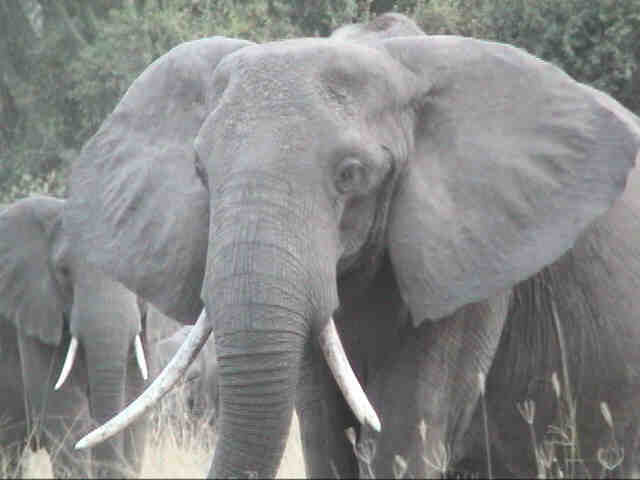
We're able to see lots of elephants. They are absolutely fascinating to watch. This one seems a little upset with us.
The sound startles the elephant enough to allow us to retreat, and a charge is not made.
After lunch and an oh-so-welcome nap, we join Gabriel for a drive to several nearby volcano craters. The trip is like riding a jack hammer, but the craters are interesting. Several have no water in them, but several others contain salty lakes. One has a completely dried-up lake bed.
On the drive back to the lodge we look again for lions and/or a cheetah, but are unsuccessful. We drive through rather open territory and see white specks scattered all about. As we get closed, we see what they are. Skeletons of animals -- hundreds of them -- attesting to successful lion kills.
Not too far from the lodge we have another exciting elephant encounter with maybe a dozen or dozen and a half of them crossing the road very close to us.
It's around 19:30 when we get back and after 21:00 when we finish dinner. Then, around 22:30, it's "lights out".
 On to Bwindi. Saturday, February 22, 2003.
On to Bwindi. Saturday, February 22, 2003.
We bid farewell to Mweya Lodge about 08:00 and begin our long drive to the Bwindi Impenetrable Forest. The distance isn't that great, but poor roads and round-about routes consume the better part of the day.
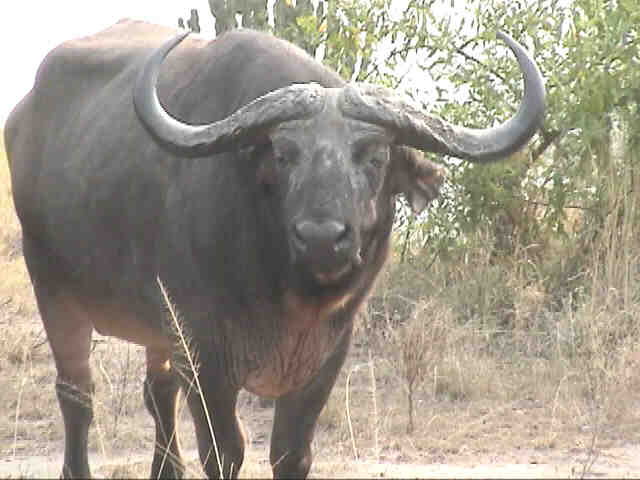
Almost immediately we see game: our first hyena, a mongoose, an enormous hippo grazing a short distance from the road, water buck, kob, wart hogs, a lone cape buffalo (photo), and lots more elephants. I am delighted with the animal sightings. There are many more encounters than I expected here in Uganda, and a greater diversity of animals, too. The leopard remains elusive, however.
The sun is bright, the temperature is just about right, and scenery along the route is stunning: vast savannah vistas stretching as far as the eye can see; old volcano craters dotted with tiny houses and carpeted with banana plants; acres and acres of bright green tea plants sculptured trim and neat from harvests; tiny and not-so-tiny communities bustling with high-energy Saturday market activities (photo): people all dressed up to go visiting or to church; and, almost the whole trip, a constant stream of people along the road on bikes, wooden "scooters", and on foot.
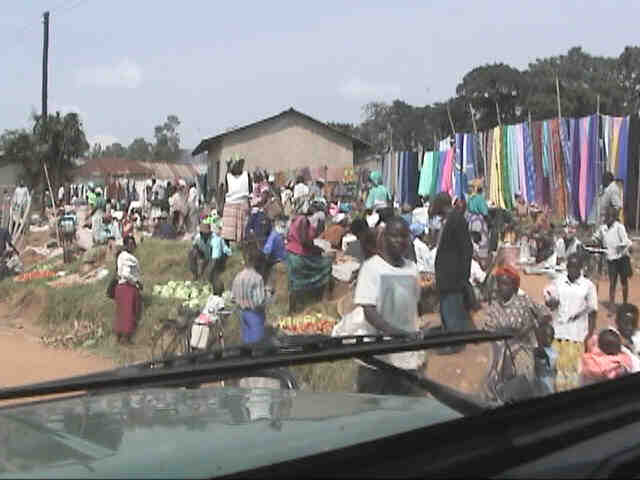
Throughout the trip, the children along the routes appear excited and happy to see us drive by. Their faces light up with big smiles, they often run to the edge of the road, and almost without fail they wave eagerly. Their displays of friendliness make us feel like celebrities!
Uganda has been described as the "Pearl of Africa" and it's not a bad description. The reign of Ide Amin, president from 1971 to 1979, tarnished greatly the reputation of the country throughout the world, but, according to Gabriel, the present leadership is succeeding with beneficial reforms for the people and nation. With its rich scenery, abundant wildlife, cordial attitude, and famous gorillas, Uganda should become a prime tourist destination.
We stop along the route at the edge of the road, half way down a mountain, to eat a boxed lunch: sandwiches, muffin, apple, passion fruit, several other items, and the never-failing bottle of water. It's more than I can eat.
After close to seven hours we arrive at our destination, the Bwindi Mantana Luxury Tented Camp. We are led to our tent (it's almost identical to what we had at the Mantana Camp near the Kibale Forest). A very light rain is falling and we are content to partake of a favorite pastime: a short nap. Later, we sort out clothing items and things for the porter to carry on our gorilla trek. We are instructed to wear long pants; a heavy, long-sleeve shirt; hiking boots; bug repellant; a hat; and leather gloves. My bucket of hot water for a shower is ready at 18:00.
Dinner is at 19:00. Unfortunately, we forget our flashlights, and after dinner it's pitch black. I ask one of the camp staff to lead us to our tent and he walks off into the nothingness with only his memory to guide him (no flashlight). Jim tries to keep up with him and I try to keep up with Jim. Neither of us is successful.
After a few steps I run into the branches of a bush or tree. Every way I turn I find more leaves in my face. Jim is calling to our "leader" and trying to move in the direction of his replies. Jim catches up just in time to hear the words "This is your tent," so he steps forward and bangs his head into the main tent post. The voice says, "That is your tent post."
Jim retrieves a flashlight and returns 25 yards or so to "rescue" me. We seek refuge in the safety of our tent for the rest of the night. (The "loosies" have returned for a second performance.)
 Gorilla My Dreams. Sunday, February 23, 2003.
Gorilla My Dreams. Sunday, February 23, 2003.
During our time here in Uganda we've heard numerous stories from tourists who report that the gorilla trek is extremely arduous. Jim and I have been wondering if we're up to the physical demands. Gabriel tells us about a woman from Hawaii who made the trek a couple of years ago and saw the gorillas. She was 83 years old! We are encouraged.
Today's the day. The day I've been looking forward to and the day I've been worrying about. We meet Gabriel at 07:45. Jim steps on the dining room platform on the way to the vehicle and his foot goes right through the floorboard. Is this an omen of things to come?
We grab our water (four bottles each!) and a packed lunch and in probably less than ten minutes we're driven to the park office where we begin our gorilla trek in the Bwinde Impenetrable Forest (I love that name). We are presented with a formal sheet with detailed trekking rules. These are redundant, as we received a "brochure" yesterday with a full set of dos and don'ts. For some reason we are requested to present our passports (they are quickly returned) before our trek commences. Is this for possible missing-person reports?
All the trekkers assemble in an open space near the office and an "official" welcomes us and goes over the rules yet again. Then we are split into "M", "HA" and "HB" groups according to who is to see which gorilla "family". It's immediately clear that the "M" team (our team) is the geriatric gang. That's good. I don't want to be a drag on a bunch of 20-year-olds.
We are introduced to Abel, our guide, and to our two porters, Moses (for Jungle Jim) and Patrick (for me). Porters are recommended if anything over two kilograms (4.4 pounds) is to be carried on the trek. Our water, box lunches, cameras, sweat shirts, rain gear, etc. qualify us for two porters.
Another wonderful service porters supply is providing assistance up steep inclines and over torturous terrain.
We are allowed to choose a walking stick, we stop off at the latrine, and we plunge into the forest. Besides the six tourists, six porters, and one guide, there are several forest rangers and four, five, or six military men (with AK47s no less) in our party.
The first major obstacle we encounter is a little river -- not much more than a stream, really -- that is maybe 20 feet wide and about a foot deep. The porters, who are all wearing rubber boots, jump in, form a human "hand rail", and guide us, rock to rock, across the water. Neat!
I think of a forest as occupying a relatively flat piece of land, maybe with some undulations. Not so with the Impenetrable Forest. It covers the side of a mountain, a pretty steep mountain, so when we "enter" it, we start a climb. Pleasantly, a serpentine pathway was cut into the mountain and we inch our way up, back and forth, on a narrow -- about one to two-feet wide -- "walkway". A better term might be "climbway".
For ten minutes, 20 minutes, 40 minutes we continue our assent of the mountain. Jungle Jim is not fairing well on the climb and is slowed by exhaustion. I'm not fairing much better. But the porters lend a hand and we all keep going. An hour passes, then an hour and a half. We still haven't reached the gorillas.
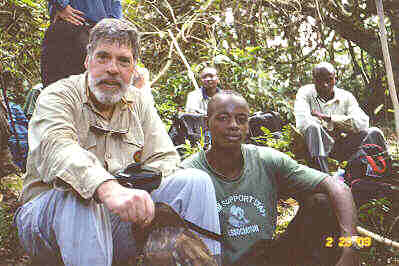
We pause to catch our breath (Jungle Jim is at left in the photo), and the guide, aided with GPS and mobile radio contact with the park office, presses on to find the beasts. After about three hours we are led off the path and through the foliage for maybe 50 yards, and there, up ahead, we can make out the form of a gorilla "hiding" in a clump of bushes.
As we get nearer, we see another, a silverback, sitting placidly in a thicket and chewing on leaves. Cameras are clicking, snapping, and buzzing, as we move closer for a better view.
The flies are thick. They swarm around the gorillas, and us, too. After some minutes, the silverback moves off into the underbrush. We follow.
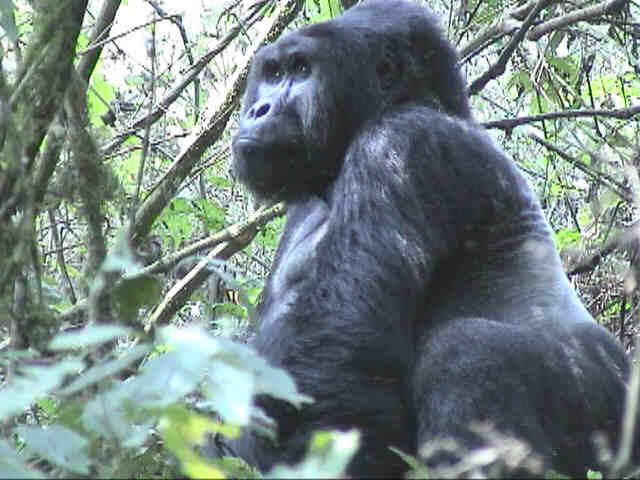
We play a little game of hide and seek for a while, but then come upon a huge male sitting largely exposed, in excellent camera position. Shutters snap and my video camera purrs. The sighting is spectacular. We are awed by the animals' size and thrilled to be so close to them in the wild.
As we get close, I wonder if the silverback will charge. He doesn't. I suppose all the attention the gorillas get is old hat now. Visitors have been trekking in Bwinde since 1991.
The guide says it's time to go, but we don't want to. It seems we've been watching the gorillas for only minutes, but a whole hour has gone by. We make our way back to the path as we exchange comments of amazement, delight, and joy.
It is an extraordinary viewing. The guide says it is unusually good. We are all thrilled. We celebrate by eating lunch.
The trek back down the mountain demonstrates to us that it was a long way up. We are told we climbed about 2000 feet. It took us about three hours. We started about 08:30 and we're not back to the park office until about 15:00 hours. We each receive a certificate of proof we trekked and saw gorillas in the Bwindi Impenetrable Forest.
It is a major victory that we actually were able to complete the trek and see the gorillas. Actually, we were very lucky. Some treks last up to five hours longer than ours. Gabriel tells us one lasted until three in the morning! And of course some treks are unsuccessful as no gorilla sightings are made (permit fees are returned in these cases).
Back at the Mantana Camp we take showers and pack. We are moving to the Gorilla Forest Camp only a few miles away. We were originally scheduled to spend all three nights there, but had to spend the first night at Mantana due to some booking mixup. I think we should receive some sort of adjustment, but Gabriel tells us no.
We had left some laundry to be washed, but a Mantana attendant took it and all the other dirty clothing he could find and washed everything. Very nice!
The Gorilla Forest Camp is outstanding. It has hot and cold running water. It has a toilet you flush! It has two double beds. It has lights bright enough to see things. It even has a bathtub!
Dinner (potato skins with bacon and cheese, leek soup, tilapia fish, vegetables, and rice pudding for dessert) is delicious. It's a pretty darn successful day.
After dinner we find one of the double beds has been turned down and there are two hot water bottles in it. Apparently the staff doesn't understand we're brothers!
Shortly after we turn out the lights we hear something scampering across the top of our tent. It's a little disconcerting because it could easily join us inside by entering through a large opening over the bathroom area. We never find out what the perpetrator was.
 Community Walk. Monday, February 24, 2003.
Community Walk. Monday, February 24, 2003.
We sleep in to 06:45. After breakfast, before 09:00, we meet Gabriel and drive to the "Community Walk" office where we pay 20,000 shillings (about $12 U.S.) for our hike, with Obedah (our guide) through a nearby village. We are offered a three-hour or five-hour walk. It's an easy choice (the former). We are also introduced to our accompanying guards (each with an AK47) Charles and Fred.
We stroll through banana fields, see more cassava, tea, coffee, sweet potato, and other crops. We are given a detailed description of the manufacture of banana beer and gin.
Next we meet the "forest healer", a medicine man of sorts, who provides herbal cures and "medications" for ills ranging from simple cuts to impotence to evil spirits. He shows us some of his concoctions and Obedah translates his descriptions into English.
We are then led past a church under construction to the "Parents' School", a private four-room school building made of bricks, and we're allowed to photograph the students in each room.
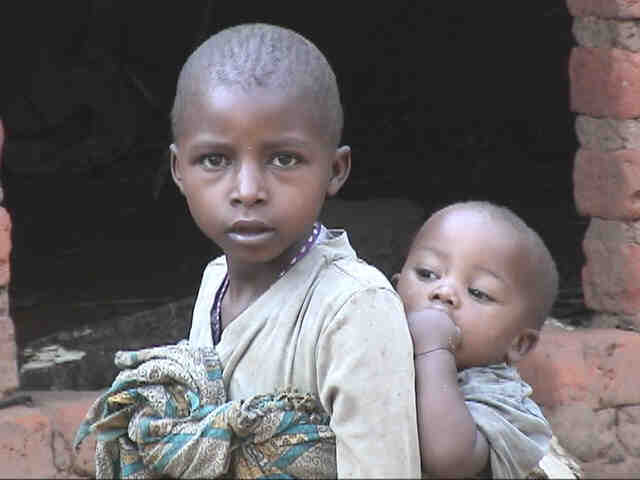
The first is filled with maybe 25 small children, six and seven years old, I'd guess. The students in the fourth room are perhaps ten or eleven years old. They all stand at "attention" when we enter, and display their very best behavior.
They seem almost as interested in us as we are in them. Very disciplined, these students could teach kids in American schools a lesson or two, I'd say. I hope my video comes out; the pictures of the kids are precious.
Obedah tells us that 85 percent of the proceeds from the "Community Walk" fee is returned to the community. I'm impressed the allocation is so generous. Later, some tourists at the camp tell us they felt pressured to make donations at each stop along the walk. Jim and I feel no such pressure (although we did contribute to the pygmies -- see below).
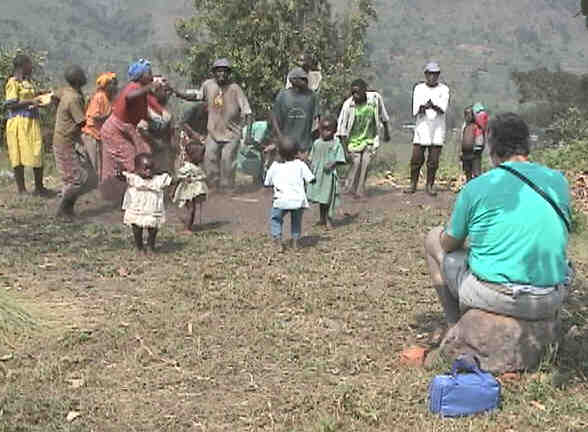
We are then led up a hill to a pygmy settlement, where the residents entertain us with several dances and songs. (Jungle Jim is on the right in the photo.) Again, the picture opportunities are unlimited and rewarding. Though running low on Uganda currency, I am anxious to leave some money with these people. When I make a very modest donation, the people respond with high gratitude.
It is a thoroughly pleasant walk; indeed a "picture-perfect" walk.
Lunch is unique. Mushroom soup, salad, breads; and set up on a table in front of the dining room is a gas-powered burner with all sorts of ingredients for pasta dishes: three different pasta types, chicken, beef, onions, peppers, garlic, cheese, ginger, with both red and white pasta sauce. Dessert is custard pie.
At 14:00 we are waiting with Gabriel in his Land Cruiser for a guide -- his name is Silver -- to take us on a three-hour hike to and from Munyaga Falls. (I'm in the photo with my ever-present, at-the-ready video camera.)
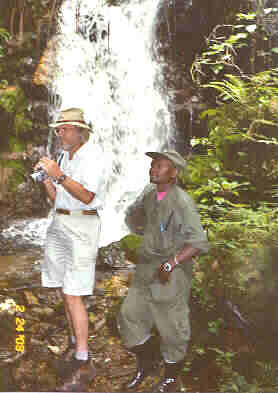
We stay at Munyaga Falls only briefly before heading back to camp. My trusty video camera is always at the ready. (Photo: Jungle Jim.)
Gabriel tells us about the 1998 incident where eight people were ambushed and killed -- at the very camp where we're staying! Only Americans and Brits were assassinated; the French citizens were unharmed. The constant company of soldiers on our hikes and treks is the government's attempt to prevent a reoccurrence of that massacre.
Two soldiers join Silver, Jim, and me for the hike. It's pretty low key. We see dozens of butterflies clustered atop some monkey dung. We see what looks like an endless parade of safari ants marching across the road. We see a tiny frog. And we see some truly picturesque forest scenes: trees, vines, moss, orchids, a fast-running stream, and of course the falls.
It's a good activity to conclude our grand tour of Uganda. We are told we might see a gorilla or some chimpanzees, or baboons, but we don't.
A group of four or five husky men with machetes passes us walking in the other direction, and my mind imagines how easy it would be to decapitate our two "guards" and capture us. The thought adds a touch of excitement to the hike, both coming and going.
After the walk we seat ourselves around the campfire in front of where the meals are served. With a glass of bitter lemon in my hand, we reminisce about our adventures as we await the 19:30 dinner call. Sami, one of those in our gorilla trekking party yesterday, tells us of her trekking successes encountered today. She was within 36 inches of a gorilla, she says! It might have been close, but I doubt it was that close.
Park officials were very concerned about the transmission of diseases between people and gorillas, and insisted the spacing be no less than seven meters (about 21 feet).
We are served dinner (eggplant with melted cheese, minestrone soup, beef stroganoff, rice, and lemon meringue pie for dessert), the waiter keeps referring to it as our "last supper". He's right. Tomorrow we fly back to Entebbe.
 Entebbe Bound. Tuesday, February 25, 2003.
Entebbe Bound. Tuesday, February 25, 2003.
Before departing the Gorilla Forest Camp, I yield to temptation and buy a hand-carved wooden gorilla head. It's only about 14 inches long, but it's adorable, as gorilla heads go, and it cost only 15,000 shillings ($9.00 U.S.).
We are at the Kayonza airstrip some 15 minutes or so before our single-prop charter plane can be seen approaching us. In another 15 minutes we are on board and skimming along the grassy field. It takes longer than I expect to take to the air, but soon we are cruising at 8000 feet on course to Entebbe.
A slight mixup delays our transfer to the Lake Victoria Hotel (our driver was told he couldn't meet us where we were told he would meet us), but we arrive here at the hotel about 12:30. After check-in we go for lunch (pizza and ice cream), which takes forever to be served (well, about two hours total).
Back in our room, we turn on the TV to see what's going on in the world. Not much. Saddam Hussein seems to be winning the stare-down contest. My guess, however, is that he will lose in the long term.
Next on the agenda, and it's a unanimous decision: a nap.
Then we retrieve the Africa Adventure bags we left here ten days ago, and it's re-packing time. We'll have a full day in probably-foggy London Town, and we need to make adjustments in preparation for colder weather.
At dusk we meet Dawn and she conducts a brief debriefing. She is interested in both our compliments, and complaints. We are pleased to have an opportunity to sing the praises of Gabriel. He was outstanding: patient, knowledgeable, a great driver, a font of information, and a friend! We couldn't recommend him highly enough.
Supper follows immediately and once again the service is very slow -- very courteous and pleasant, but sometimes so slow it's exasperating. I ask for the check and some time later I'm presented with five bills -- three for drinks and two for our dinners. On each I must provide my name, room number and signature.
We check the TV again. It's a waste of time. There's nothing worth seeing. It's then lights out at about 22:00.
 On to London. Wednesday, February 26, 2003.
On to London. Wednesday, February 26, 2003.
Jim takes the first shower this morning. The water isn't running a minute before I hear a loud exclamation. The shower curtain rod had fallen and hit him in the head. No major damage.
We are ready in the lobby at 08:00, the scheduled pick-up time, and Mohammed and his vehicle appear moments later. On the drive to the airport we learn that a big jet parked a short distance from the end of the runway (off the airport property) is the plane that was hijacked by Arab and German terrorists in 1976. It is laced with bullet holes and is not repairable, we're told, so it's used as a "museum" for school children.
Souvenir shopping in the airport departure area is disappointing. Selection is rather limited and prices are unreasonably high in my opinion. I buy a few items nonetheless, before we board the British Airways plane for our flight to London.
It's a good flight. Occasionally, the clouds are thin enough for me to look down and see the ground (I have the window seat). I get several great views of the Sahara Dessert, but cloud cover prevents any sight of the Mediterranean or France.
Going through immigration and customs is easy, but getting from Heathrow to London isn't. Now with three fairly heavy bags each, we don't think we can negotiate the tube very easily, the next hotel bus is a two and a half hour wait away, and a taxi is too expensive -- about $65 (U.S.). We finally decide to take a cab in spite of the frightening price tag.
The Rembrandt Hotel is directly across the street from the Victoria and Albert Museum, a block or so from the Natural History Museum, and Harrods is less than a half mile away in the other direction. It's a great location.
After we check in and carry our bags to the room (#459), we're surprised to see the TV set is on and the screen says, "Welcome Fred Gielow". It's sort of nice.
We have our fourth meal of the day -- Jim: pasta and meat balls, me: cheese plate. We check out the TV in our room and watch the last few minutes of a program titled "England's worst Drivers." Quite entertaining.
 A Day on the Town. Thursday, February 27, 2003 (malaria tablet day).
A Day on the Town. Thursday, February 27, 2003 (malaria tablet day).
We went to bed last night at about 00:30 Uganda time (21:30 London time), so we awaken early, but not as early as you might think: 05:30 (08:30 in Uganda).
Breakfast (a buffet) is very nice. The weather report is discouraging: the chance of rain increases throughout the day. We start off on our "grand tour" (a hike) of London at about 09:00. I take an umbrella; Jim takes his waterproof jacket.
Harrods isn't open when we get there (it opens at 10:00), but it is, after all, just a big department store. We continue along Brompton Road and Knightsbridge to the Wellington Arch, with me taking videos here, there, everywhere.
We stroll along Constitution Hill Road with Green Park on the left and the Buckingham Palace property on our right. I'm going wild taking pictures. It has been 48 years since I first visited London and saw these sights.
After stopping at the Buckingham Palace gate, we head down The Mall, then into St. James Park. The temperature is cool, but not cold; it's cloudy but not rainy or foggy. It's really very pleasant.
We continue to Trafalgar Square, then to Piccadilly Circus, then head back toward Big Ben.
Just by good fortune we encounter a procession of horse-mounted guards heading for a changing-of-the-guards ceremony adjacent to Horse Guards Road. What a photo op!
On to Big Ben, the Houses of Parliament, Westminster Abby, and Parliament Square. We cross Westminster Bridge and find a place to eat: the All Bar One. I know it's not right, but I order a hamburger and fries. Very good! Jim has a steak sandwich and fries.
We are right next to the London Eye, so we buy tickets and get in line. The line moves quickly and soon we're inside one of the capsules. Slowly, slowly, slowly we rise to the top of the Ferris-wheel-like ride. The views are breathtaking.
Back on the ground we re-cross the Thames, walk along the edge of the river, then descend into the Underground at the Embankment Station. We plan to exit at Monument Station, but an announcement tells us the stop is closed, so we get off at Cannon Street, then continue on foot to the Tower of London and London Bridge. It's too late (after 16:00) for a tower tour, but we satisfy ourselves with lots of photos.
Back in the "tube", we ride to the South Kensington Station which exits just steps from our hotel. What a great day! We estimate we walked about ten miles and it didn't rain a drop! As a matter of fact, the sun came out briefly in the afternoon.
We eat supper (a sizzling platter of prawns and then ice cream for Jim; soup and then cake for me) at the hotel as it's fast, convenient, and tasty. After another re-packing exercise, we turn in.
 All Good Things Must Come to an End. Friday, February 28, 2003.
All Good Things Must Come to an End. Friday, February 28, 2003.
Last night I left a request for a 06:30 wake-up call. At 06:25 the TV automatically turns on, the sound wakes us, and a message on the screen advises us to press any key on the remote control unit to confirm that we did indeed wake up. I had never seen such a system before.
The buffet breakfast is again just fine (the hot tea with lemon and sugar cubes is out of this world!). At 08:25 we are checked out and waiting for a car which will take us back to Heathrow. We reserved the car yesterday after we found it was ten pounds or so less expensive than a taxi.
The car is right on time and it whisks us off to the airport. The driver remarks that the traffic -- it's rush hour -- is much lighter than usual.. He says a new regulation (a five pound fee for each car driven into downtown London) may be largely responsible for the reduced congestion.
Jim gets off at Terminal 4 and our driver takes me to Terminal 3, some 15 minutes away. I have a wait ahead. It's just a little after 09:00 and my flight doesn't depart until 13:30.
Right now my watch tells me it's 13:45, 15 minutes after we were scheduled to depart. Passengers are still filing into the cabin. I see a drizzling rain is falling as I look out of my seat 44A window. We are indeed lucky we had such good weather for our walk yesterday.
As we start our push-back from the gate, I notice it's 13:50. We'll be on our way momentarily. It's 4400 miles to Miami.
It has been a glorious trip. The weather was good, often excellent; the accommodations ranged from OK to stellar; the flights were pretty much uneventful; the service we received was generally outstanding; and, once again, the animals were exciting, thrilling, and rewarding. The gorilla encounter was absolutely spectacular!
A couple of nights ago Sami, one of the guests at the Gorilla Forest Camp, asked me what my plans are for my next big trip. I don't have any plans right now. This Uganda adventure has been my focus of attention for the past 12 months and I haven't even thought about what's beyond it.
Whatever turns out to be my next destination, however, must include a healthy dose of animal encounters. For me the joy of seeing them on their own turf just can't be bettered by sightseeing in cities, at the seashore, or in the mountains. Time with some of God's mighty creatures, and the not-so-mighty as well, is like a balm. It comforts and soothes. Yet, at the same time, it stimulates the mind, sends the adrenalin coursing, and satisfies the soul.
(Hear the gorilla.)
 The way back home. The way back home.
|
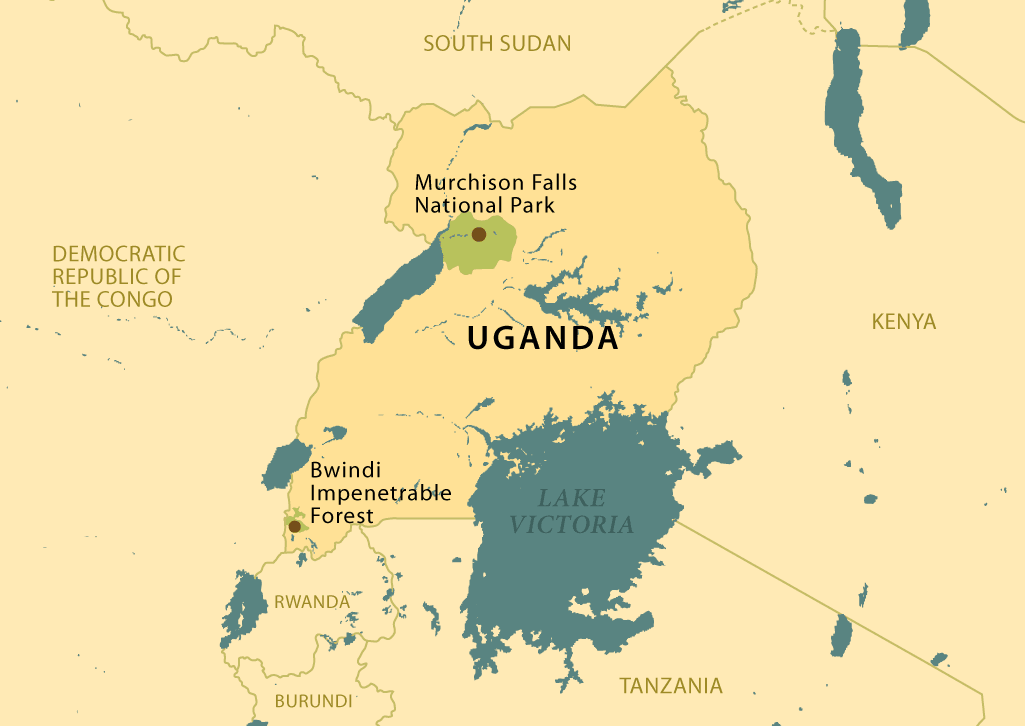
 To London Town. Wednesday, February 12, 2003.
To London Town. Wednesday, February 12, 2003.












